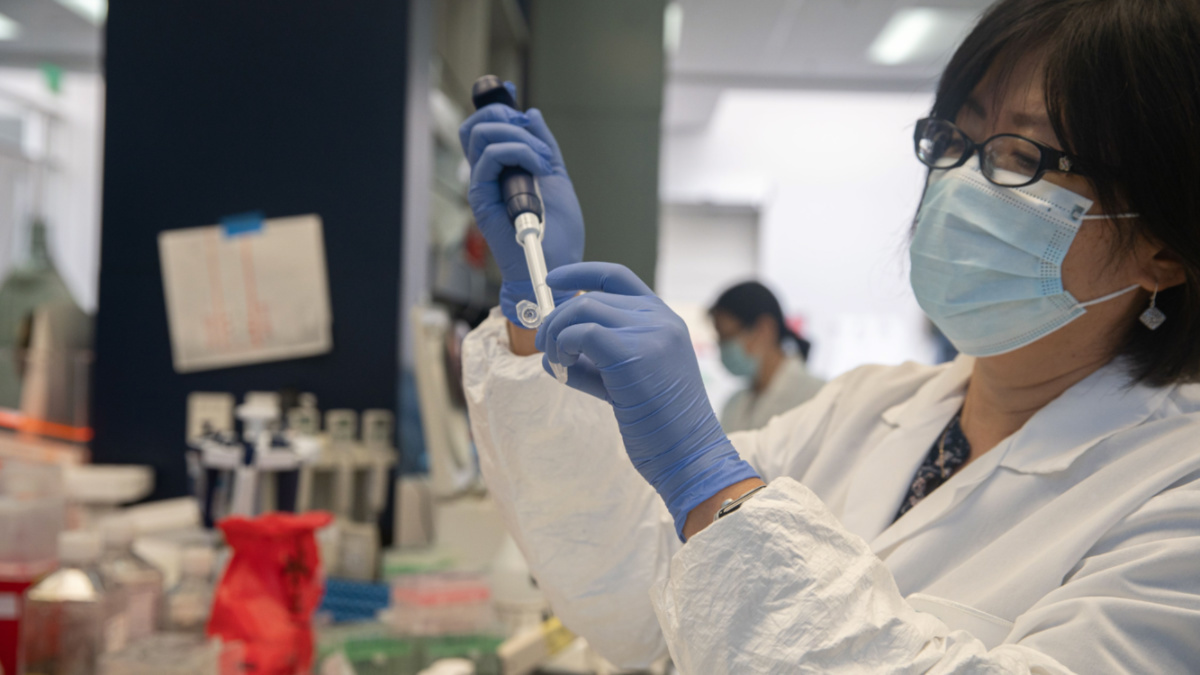
House Dems Introduce Bill to Prevent Big Pharma Price Gouging During COVID-19 Pandemic

Sorrento Therapeutics in San Diego, California, is developing a COVID-19 treatment. ARIANA DREHSLER / AFP / Getty Images
By Jessica Corbett
On the heels of polling that showed 88% of Americans worry Big Pharma will exploit the ongoing pandemic to hike drug prices, House Democrats on Monday introduced two bipartisan bills to prevent price gouging for Covid-19 treatments and vaccines and to strengthen oversight of federal spending on coronavirus research and development.
Public Citizen president Robert Weissman welcomed the legislation in a statement. “This is about way more than ensuring taxpayers aren’t ripped off, as important as that objective is,” he declared. “Promoting transparency and reasonable pricing of Covid-19 treatments and vaccines is a life-and-death matter.”
“President Donald Trump’s sycophancy to drug corporations is endangering the nation’s pandemic response,” Weissman warned. “Although public investments are driving drug and vaccine development, the Trump administration is permitting drug companies to retain monopoly control over the drugs and vaccines, including those still under development.”
“The administration is refusing to use its existing authorities to enable knowledge sharing and generic competition. Nor is the administration seeking enhanced powers from Congress,” he added. “The certain result will be profiteering, rationing, and inadequate supplies of the medicines and vaccines desperately needed to treat and eliminate the virus.”
The Make Medications Affordable by Preventing Pandemic Price-gouging (MMAPPP) Act introduced Monday is sponsored by Rep. Jan Schakowsky (D-Ill.), a senior chief deputy whip and chair of the House Energy and Commerce Consumer Protection and Commerce Subcommittee. Schakowsky said that “we have good reason to be skeptical about the role of the pharmaceutical industry.”
“Well before this pandemic, we saw price gouging that cost lives. Now, during a global health crisis, many pharmaceutical companies will see another opportunity to benefit themselves by ‘pandemic profiteering.’ That cannot stand,” she said. “Congress must guarantee affordable Covid-19 drugs, eliminate monopolies on these drugs, and ensure transparency for taxpayers who developed them.”
Over the past three months, Congress has appropriated BILLIONS of dollars to support research and development of #COVID19 treatments and vaccines. Despite this federal investment, the Trump Administration has done nothing to prevent Big Pharma from price gouging U.S. taxpayers. pic.twitter.com/JKS3ZH46x4
— Jan Schakowsky (@janschakowsky) June 22, 2020
As a statement from the congresswoman’s office outlined, the MMAPPP Act would prevent price-gouging by:
- Prohibiting pharmaceutical monopolies on new, taxpayer-funded Covid-19 drugs in order to ensure universal access to these drugs;
- Requiring the federal government to mandate reasonable, affordable pricing of any new, taxpayer-funded Covid-19 drug used to diagnose, mitigate, prevent, or treat Covid-19
- Ensuring transparency and requiring manufacturers to publicly report a specific breakdown of total expenditures on any Covid-19 drug, including what percentage of those expenditures were derived from federal funds; and
- Preventing excessive pricing of drug used to treat any disease that causes a public health emergency by waiving exclusive licenses and compensating with a reasonable royalty.
The second bill, the Taxpayer Research and Coronavirus Knowledge (TRACK) Act, would establish a single database for Covid-19 research and development detailing all the financial and non-financial federal support for pharmaceutical companies, information on clinical trials and patents, and the full terms of deals between the government and drug manufacturers.
“Transparency and accountability are always vital tonics to keep democracy healthy,” said Rep. Lloyd Doggett (D-Texas), the bill’s lead sponsor and chair of the House Ways and Means Health Subcommittee. “Crafting a new, strong oversight tool, the TRACK Act reveals to taxpayers how billions of public funds are being used—information any private investor would demand.”
Both pieces of legislation are backed by Congressional Progressive Caucus Co-Chairs Mark Pocan (D-Wis.) and Pramila Jayapal (D-Wash.) as well as Reps. Peter DeFazio (D-Ore.), Rosa DeLauro (D-Conn.), and Francis Rooney (R-Fla.). DeLauro is chair of the House Labor, Health and Human Services, Education, and Related Agencies Appropriations Subcommittee, which funds the National Institutes of Health and the Biomedical Advanced Research and Development Authority.
Because of that role, DeLauro said, “I am all deeply aware of just how much money the U.S. government invests in the critical, life-saving biomedical research in this country, and we have allowed the pharmaceutical industry to take advantage of this investment, and price-gouge taxpayers. Getting any sort of information from this administration has been virtually impossible during this pandemic, and taxpayers have a right to know how their dollars are being spent.”
The MMAPPP Act is endorsed by dozens of organizations, including the Center for Popular Democracy Action, Oxfam America, and Peoples Action. Supporters of the TRACK Act include AARP, Project on Government Oversight, and Communication Workers of America. Some groups—such as American Federation of Teachers, Americans for Tax Fairness, Indivisible, MomsRising, Public Citizen, and Social Security Works—support both.
“The legislative proposals from Reps. Schakowsky and Doggett prioritize public health over Big Pharma’s profits,” said Weissman. “Public Citizen thanks Schakowsky and Doggett for their leadership and urges immediate passage of these bills.”
Reposted with permission from Common Dreams.
- Superbug Risk Rises as Big Pharma Fails to Disclose Antibiotic ...
- Big Pharma Emits More Greenhouse Gases Than the Automotive ...
- FDA Officially Belongs to Big Pharma With Senate Confirmation of ...

 233k
233k  41k
41k  Subscribe
Subscribe 